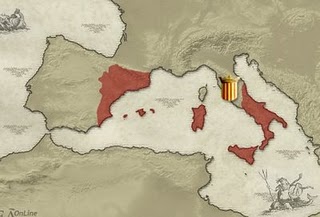
The Aragonese Revolt

Ever since the kingdom of Aragon and the Kingdom of Castile became one (essentially since the marriage between Ferdinand and Isabella, the Catholic Monarchs, and more officially during Charles V's reign), the latter became like a parents' favorite child. It received much more attention and gained much more political resonance that it would lead to the Aragonese revolt. See the Comuneros revolt and its historic consequences. Where did it originate? In the kingdom of Castile.
So the country was going through some intensive Spanish changes, going as far as defining a capital in a centre city called Madrid. And Castilian, for several reasons, was being more prominent, culture-wise than anything.
This wasn't fair to the kingdom of Aragon, ever independent , ever politically assertive. They had their own Cortes (courts), which were doing most of the influential work for Spain, and the kingdom of Castile was getting the glory of being the culture that was predominating in the now glorious country.

In their confusion, the kingdom of Aragon became confident that King Philip wanted to remodel it after Castile - he was looking at Castilian nobility for the succession. This led the Aragonese nobility to try and be more important by getting more money. This meant, as always, rising the peasant's taxes.
So things were a little tense when an Aragonese noble, the Duke of Villahermosa, conflicted with a Castilian one, the Count of Chinchón. The excuse for their dispute was the Barony of Ribagorza, but that soon became unimportant when King Philip IV interfered in the story, trying to change the constitution of the Kingdom of Aragon .
This was perceived as a Castilian infringement and the Justicia of Aragon stepped up in defense of Aragon's rights. A mob rised. Officials from the Kingdom of Castile were attacked in Zaragoza. Amidst the Aragonese revolt, King Philip's envoy, the Marquis de Almenara, died in the attack.
This all resulted in considerable damage as tension escalated. The king responded with royal troops, which eventually quieted the Aragonese revolt. Aragon lost all chances to regain its prominence and became politically ostracized. The central government in Madrid became Castilian in nature. All Aragon achieved was being politically ignored.
The weight of the Kingdom of Castile, inexplicable to most of the Aragonese population, had won.
